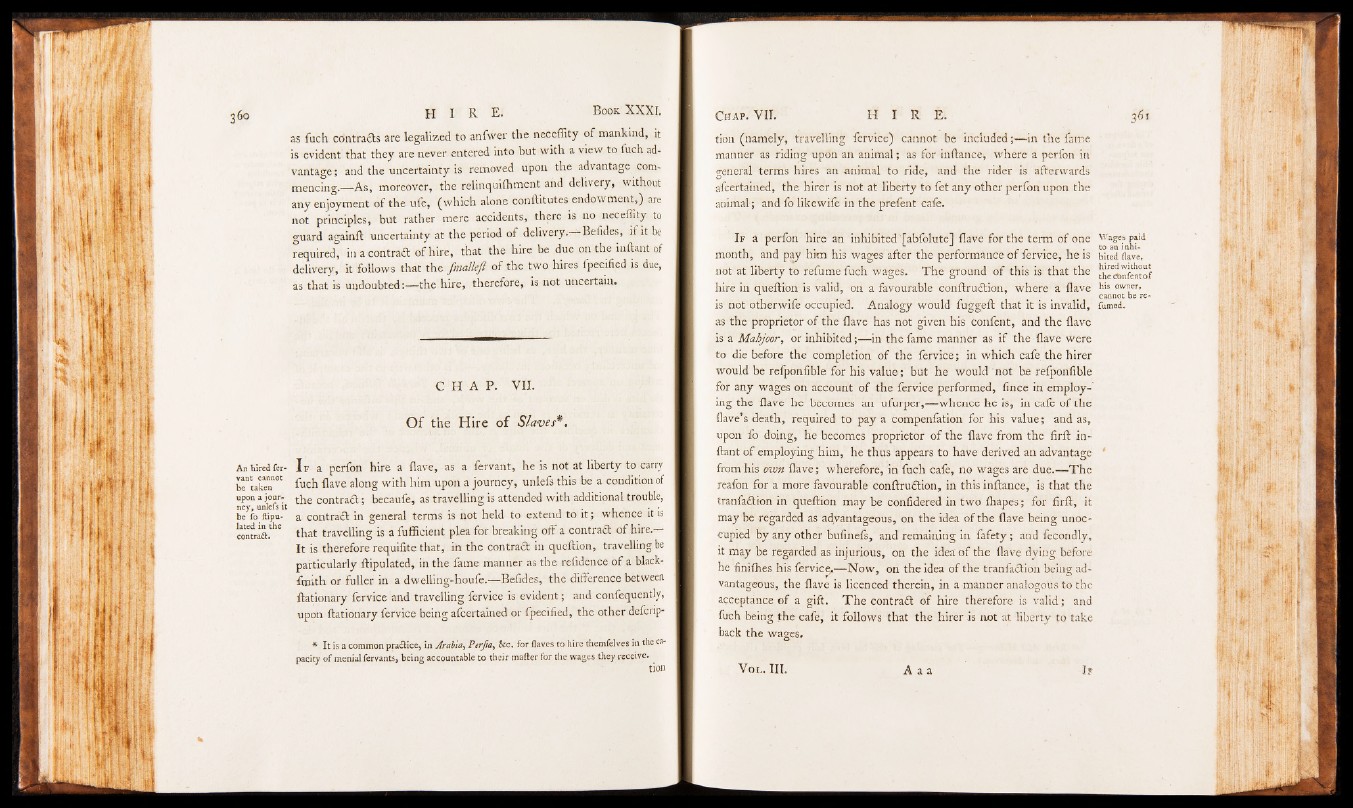
as fuch cont rafts are legalized to anfwer the neceffity of mankind, it
is evident that they are never entered into but with a view to fuch advantage
; and the uncertainty is removed upon the advantage commencing.—
As, moreover, the relinquifhment and delivery, without
any enjoyment of the ufe, (which alone conftitutes endowment,) are
not principles, but rather mere accidents, there is no neceffity to
guard againft uncertainty at the period of delivery.—“Betides, if it be
required, in a contract of hire, that the hire be due on the inftant of
delivery, it follows that the fmallefi of the two hires fpecified is due,
as that is undoubted:— the hire, therefore, is not uncertain.
C H A P . VII.
O f th e Hire of Slaves*.
An hired fer-
vant cannot
be taken
upon a journey,
unlefs it
be fo ftipu-
lated in the
contrail.
I f a perfon hire a (lave, as a fervant, he is not at liberty to carry
fuch Have along with him upon a journey, unlefs this be a condition of
the contract; becaufe, as travelling is attended with additional trouble,
a contract in general terms is not held to extend to it; whence it is
that travelling is a fufficient plea for breaking off a contract of hire.
It is therefore requifite that, in the contract in queftion, travelling be
particularly ftipulated, in the fame manner as the refidetice of a black-
fmith or fuller in a dwelling-houfe.— Belides, the difference between
ftationary fervice and travelling fervice is evident; and confequently,
upon ftationary fervice being afcertained or fpecified, the other defcnp-
* I t is a common practice, in Arabia. Perjia, & c . for flaves to hire themfelves in the capacity
o f menial fervants, being accountable to their mailer for the wages they receive.
' tioil
tion (namely, travelling fervice) cannot be included;— in the fame
manner as riding upon an animal; as for inftance* where a perfon in
general terms hires an animal to ride, and the rider is afterwards
afcertained, the hirer is not at liberty to fet any other perfon upon the
animal; and fo likewife in the prefent cafe.
I f a perfon hire an inhibited Tabfolute] flave for the term of one
month, and pay him his wages after the performance of fervice, he is
not at liberty to refume fuch wages. The ground of this is that the
hire in queftion is valid, on a favourable conftruction, where a flave
is not otberwife occupied. Analogy would fuggeft that it is invalid,
as the proprietor of the flave has not given his confent, and the flave
is a Mahjoor, or inhibited;— in the fame manner as if the flave were
to die before the completion of the fervice; in which cafe the hirer
would be refponfible for his value; but he would not be refponfible
for any wages on account of the fervice performed, fince in employing
the flave he becomes an ufurper,— whence he is, in cafe o f the
flave’ s death, required to pay a compenfation for his value; and as,
upon fo doing, he becomes proprietor of the flave from the firfl in-
ftant of employing him, he thus appears to have derived an advantage
from his own flave; wherefore, in fuch cafe, no wages are due.— The
reafon for a more favourable conftrudtion, in this inftance, is that the
tranfadlion in queftion may be confidered in two fhapes; for firft, it
may be regarded as advantageous, on the idea of the flave being unoccupied
by any other bufinefs, and remaining in fafety ; and fecondly-,
it may be regarded as injurious, on the idea of the flave dying before
he finifhes his fervice.— Now, on the idea of the tranfadtion being advantageous,
the flave is licenced therein, in a manner analogous to the
acceptance of a gift. T h e contradt of hire therefore is valid; and
fuch being the cafe, it follows that the hirer is not at liberty to take
back the wages.
Wages paid
to an inhibited
flave,
hired without
the d>nfentof
his owner,
cannot be refumed.
V ol. III. A a a I f